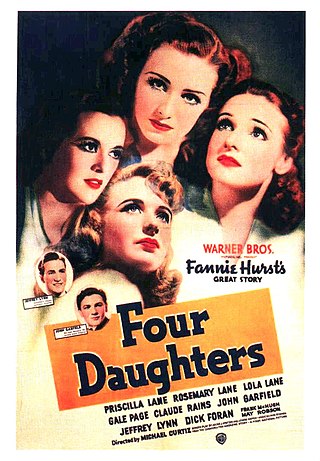
Four Daughters is a 1938 American romance film that tells the story of a happy musical family whose lives and loves are disrupted by the arrival of a charming young composer who interjects himself into the daughters' romantic lives. His cynical, bitter musician friend comes to help orchestrate his latest composition and complicates matters even more. The movie stars the Lane Sisters and Gale Page, and features Claude Rains, Jeffrey Lynn, John Garfield, and Dick Foran. The three Lanes were sisters and members of a family singing trio.
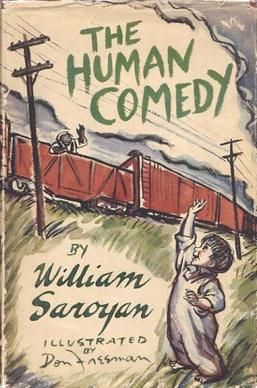
The Human Comedy is a 1943 novel by William Saroyan. It originated as a 240-page film script written for MGM. Saroyan was planning to produce and direct the film, but he was dropped from the project either because the script was too long or because a short film he directed as a test was not considered acceptable — or both. He walked off the lot, went home, and swiftly created a novelization, which was published just before the film came out. It was the March 1943 Book-of-the-Month Club selection, and became a best-seller a week after its release. Saroyan won the Academy Award for Best Story for the film, The Human Comedy.
The Sundowners is a 1960 Technicolor comedy-drama film that tells the story of a 1920s Australian outback family torn between the father's desires to continue his nomadic sheep-herding ways and the wife and son's desire to settle in one place. The Sundowners was produced and directed by Fred Zinnemann, adapted by Isobel Lennart from Jon Cleary's 1952 novel of the same name, with Deborah Kerr, Robert Mitchum, and Peter Ustinov, Glynis Johns, Mervyn Johns, Dina Merrill, Michael Anderson Jr., and Chips Rafferty.

Babes on Broadway is a 1941 American musical film starring Mickey Rooney and Judy Garland and directed by Busby Berkeley, with Vincente Minnelli directing Garland's big solo numbers. The film, which features Fay Bainter and Virginia Weidler, was the third in the "Backyard Musical" series about kids who put on their own show, following Babes in Arms (1939) and Strike Up the Band (1940). Songs in the film include "Babes on Broadway" by Burton Lane (music) and E.Y. "Yip" Harburg (lyrics), and "How About You?" by Lane with lyrics by Ralph Freed, the brother of producer Arthur Freed. The movie ends with a minstrel show performed by the main cast in blackface.

Bring Your Smile Along is a 1955 American Technicolor comedy film by Blake Edwards. It was Edwards' directorial debut and the motion picture debut of Constance Towers. Edwards wrote the script for this Frankie Laine musical with his mentor, director Richard Quine. Songs Laine sang in the film included his 1951 hit "The Gandy Dancers' Ball."
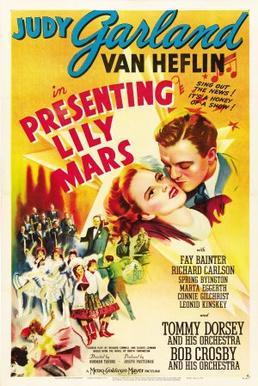
Presenting Lily Mars is a 1943 American musical comedy film directed by Norman Taurog, produced by Joe Pasternak, starring Judy Garland and Van Heflin, and based on the novel by Booth Tarkington. The film is often cited as Garland's first film playing an adult type role. Tommy Dorsey and Bob Crosby appear with their orchestras in this Metro-Goldwyn-Mayer production.

Hollywood Party, also known under its working title of The Hollywood Revue of 1933 and Star Spangled Banquet, is a 1934 American pre-Code musical film starring Laurel and Hardy, The Three Stooges, Jimmy Durante, Lupe Vélez and Mickey Mouse. It was distributed by Metro-Goldwyn-Mayer. Each sequence featured a different star with a separate scriptwriter and director assigned.

Thoroughbreds Don't Cry is a 1937 American musical comedy film directed by Alfred E. Green and starring Mickey Rooney and Judy Garland in their first film together.

Star Spangled Rhythm is a 1942 American all-star cast musical film made by Paramount Pictures during World War II as a morale booster. Many of the Hollywood studios produced such films during the war, generally musicals, frequently with flimsy storylines, and with the specific intent of entertaining the troops overseas and civilians back home and to encourage fundraising – as well as to show the studios' patriotism. This film was also the first released by Paramount to be shown for 8 weeks.

The Human Comedy is a 1983 musical with a book and lyrics by William Dumaresq and music by Galt MacDermot.

The Heavenly Body is a 1944 American romantic comedy film directed by Alexander Hall and starring William Powell, Hedy Lamarr and James Craig. Based on a story by Jacques Théry, with a screenplay by Michael Arlen and Walter Reisch, the film is about the beautiful wife of a professional astronomer who becomes convinced that her astrologer's prediction that she will meet her true love will come true. Produced by Arthur Hornblow Jr., The Heavenly Body was released by Metro-Goldwyn-Mayer in the United States on March 23, 1944.
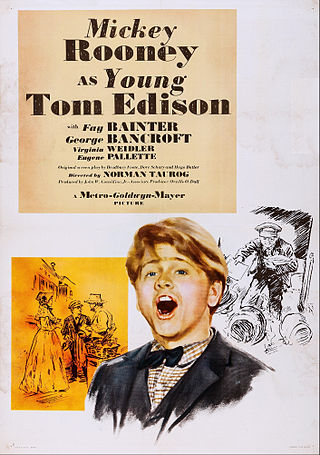
Young Tom Edison is a 1940 biographical film about the early life of inventor Thomas Edison directed by Norman Taurog and starring Mickey Rooney. The film was the first of a complementary pair of Edison biopics that Metro-Goldwyn-Mayer released in 1940. Edison, the Man, starring Spencer Tracy, followed two months later, completing the two-part story of Edison's life.

Girl Crazy is a 1943 American musical film starring Judy Garland and Mickey Rooney. Produced by the Freed Unit of Metro-Goldwyn-Mayer, it is based on the stage musical Girl Crazy – which was written by Guy Bolton and Jack McGowan, with music and lyrics by George and Ira Gershwin. It was the last of Garland and Rooney's nine movies as co-stars, the pair appearing only once more together on film, as guest stars in 1948's Words and Music.
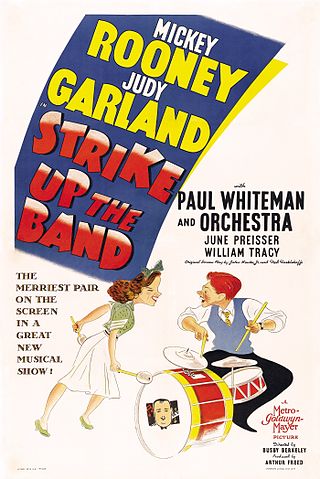
Strike Up the Band is a 1940 American musical film produced by the Arthur Freed unit at Metro-Goldwyn-Mayer. The film was directed by Busby Berkeley and stars Mickey Rooney and Judy Garland, in the second of a series of musicals they co-starred in, after Babes in Arms, all directed by Berkeley. The story written for the 1927 stage musical Strike Up the Band, and its successful 1930 Broadway revision, bear no resemblance to this film, aside from the title song.

Men of Boys Town is a 1941 American drama film directed by Norman Taurog and written by James Kevin McGuinness. It is a sequel to the 1938 film Boys Town. The film stars Spencer Tracy, Mickey Rooney, Bobs Watson, Larry Nunn, Darryl Hickman and Henry O'Neill. The film was released on April 11, 1941, by Metro-Goldwyn-Mayer.
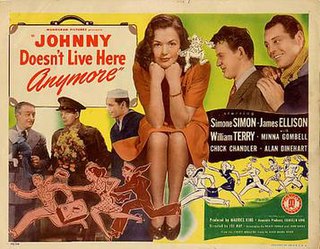
Johnny Doesn't Live Here Anymore is a 1944 American romantic comedy film starring Simone Simon, James Ellison, William Terry, and featuring Robert Mitchum in an early role. Produced by King Brothers Productions, it was co-written by Philip Yordan and directed by the Austrian director Joe May, and constitutes the final film directed by Joe May. It was based on a short story purchased by the King Brothers. The film has fantasy elements, with the main character being followed by a gremlin.

Ithaca is a 2015 American drama film directed by Meg Ryan and written by Erik Jendresen. It is based on the 1943 novel The Human Comedy by William Saroyan. The film stars Alex Neustaedter, Jack Quaid, Meg Ryan, Sam Shepard, Hamish Linklater and Tom Hanks. The film was released on September 9, 2016, by Momentum Pictures.

Ding Dong Williams is a 1946 American comedy film directed by William Berke. The film stars Glen Vernon, Marcy McGuire, Felix Bressart, Anne Jeffreys, and James Warren. It was released on April 15, 1946 by RKO Radio Pictures.

Harry Allen was an Australian-born American character actor of the silent and sound film eras. He was born in Melbourne, Victoria, Australia. Allen's World War One registration card gives his date of birth as 10 July, 1876 and confirms his place of birth as Melbourne, although at least one obituary gives the later birth year of 1883.

Melody Lane is a 1941 American comedy film directed by Charles Lamont and written by Hugh Wedlock Jr., Howard Snyder, Morton Grant and George Rony. The film stars Leon Errol, Anne Gwynne, Robert Paige, Billy Lenhart, Kenneth Brown and Don Douglas. The film was released on December 9, 1941, by Universal Pictures.


















